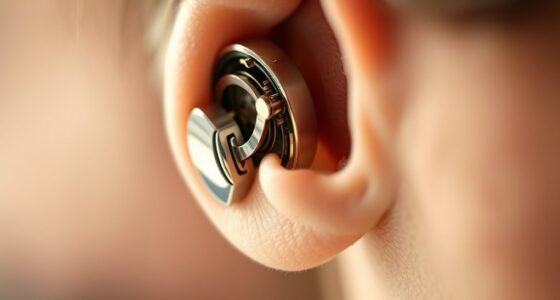Imagine a world where the beautiful melodies of life are silenced, and the happy laughter of our loved ones fades into silence.
Now, picture a device that can unlock these hidden treasures of sound for your child. Cochlear implants hold the key to a vibrant auditory landscape, but how do they truly impact a child's world?
The journey of enhancing hearing through these advanced devices is a compelling tale of resilience, adaptability, and the power of technology to bridge gaps in communication.
Curious to explore how this journey unfolds for your child?
Key Takeaways
- Cochlear implants benefit children with severe to profound hearing loss.
- Implants enhance speech, language, and sound clarity significantly.
- Surgery and activation are pivotal steps in the implant process.
- Ongoing support, therapy, and follow-ups optimize auditory development.
Understanding Cochlear Implants
When considering cochlear implants for your child, it's crucial to understand how this innovative technology can transform their auditory experience.
Cochlear implants are specifically designed to benefit children with severe to profound hearing loss in both ears.
These implants work by bypassing damaged ears to directly stimulate the hearing nerve, allowing children as young as 9 months old to be eligible for this life-changing intervention.
Benefits of Cochlear Implants

Understanding how cochlear implants can significantly enhance a child's auditory awareness and language development is essential for parents considering this transformative technology. Cochlear implant surgery offers numerous benefits for children with hearing loss. One major advantage is the improvement in speech and language skills. Children with cochlear implants often experience enhanced speech understanding, clarity of sounds, and overall language development. Additionally, these implants enable children to benefit from cochlear technology, allowing them to hear sounds at levels comparable to those with normal hearing.
Moreover, children with cochlear implants may find it easier to hear in noisy environments, leading to an improved quality of life. This enhanced hearing capability can also contribute to better educational outcomes, potentially allowing children to attend mainstream schools and fully engage in academic activities. By providing access to crucial auditory information, cochlear implants play a vital role in enriching the lives of children with hearing loss.
Process of Getting Implants
The process of receiving cochlear implants involves a surgical procedure that's typically performed under general anesthesia. During the surgery, which usually lasts 3 to 6 hours, an incision is made behind the ear to place the receiver/stimulator and electrode array. This electrode array is inserted into the cochlea to stimulate the auditory nerve directly. While the surgery is generally safe, there are rare risks such as facial nerve paralysis or dizziness.
It is essential to understand that after the surgical procedure, your child will need time to heal before the implant can be activated. Typically, the external sound processor will be fitted around four weeks post-surgery. Following this, regular audiological visits will be necessary for programming adjustments to ensure optimal hearing outcomes. The process of getting cochlear implants is a significant step towards enhancing your child's hearing abilities, and our team is here to support you every step of the way.
Expectations After Surgery

As your child progresses through the recovery period post-cochlear implant surgery, it is crucial to understand the adjustments and expectations that come with activating the implant for optimal sound perception. Cochlear implant activation is a significant milestone in your child's journey towards enhanced hearing. It involves programming the implant to provide the best possible sound experience. It's important to note that adjusting to new sounds may take time as the brain adapts to this novel way of hearing. Regular follow-up appointments with the audiologist are essential to monitor progress and fine-tune the implant settings for maximum benefit.
Below, we outline some key expectations and tips for supporting your child's auditory development post-surgery:
| Expectations | Tips |
|---|---|
| Adjustment Period | Be patient and supportive during the transition period. |
| Auditory Development | Engage in listening activities and speech therapy to promote progress. |
| Follow-up Appointments | Attend all scheduled appointments for necessary adjustments. |
| Parental Support | Provide encouragement and actively participate in your child's listening journey. |
Resources for Further Information
Let's explore the wealth of resources available to assist families navigating the world of cochlear implants for their children. When considering cochlear implants for your child, it's essential to have access to reliable information and support. Organizations like Cochlear provide free informational guides that can help you understand the implant process, benefits, and outcomes for children with severe to profound hearing loss. These resources can empower you to make well-informed decisions regarding your child's hearing health.
Additionally, finding specialized hearing health professionals is crucial in the cochlear implant journey. These professionals can evaluate your child's candidacy for cochlear implants, provide necessary guidance, and offer ongoing support throughout the process. Connecting with mentors who've firsthand experience with cochlear implants can also offer valuable insights and emotional support for both you and your child.
Frequently Asked Questions
Can Cochlear Implants Enhance Hearing?
Yes, cochlear implants can enhance hearing by providing improved auditory awareness, speech understanding, and language skills. They offer better hearing in noisy environments, leading to enhanced quality of life and educational outcomes.
Children aged 9-24 months with limited benefit from hearing aids may benefit from cochlear implants if speech scores fall below 30% on the MLNT test.
How Can I Help My Child With a Cochlear Implant?
We can support our child with a cochlear implant by fostering a positive environment that encourages consistent wear and engagement in listening activities. Attending regular appointments for adjustments and monitoring progress is crucial.
Can Cochlear Implants Be Upgraded?
Yes, cochlear implants can be upgraded with newer external components like the speech processor. This upgrade offers improved features such as enhanced sound processing algorithms or connectivity options. It doesn't involve replacing the internal electrode array.
Typically recommended when newer models provide better performance or extra functionalities, consulting with an audiologist or specialist is crucial. They can determine if an upgrade suits your child's specific needs.
What Is Negative About Cochlear Implants?
Certainly!
One important aspect to consider about cochlear implants is the potential risks and challenges associated with them. Complications like infection, device failure, and surgical damage to nearby structures can occur. Some children may face difficulties with sound quality, speech perception, and hearing in noisy environments after receiving an implant. Regular maintenance, including battery changes and adjustments by audiologists, is also necessary.
Financial concerns due to insurance coverage limitations can pose additional hurdles for families.
Conclusion
In conclusion, cochlear implants offer a world of sound and possibilities for children with hearing loss. From the initial consultation to the post-surgery therapy, the journey may seem daunting, but the rewards are truly ear-opening.
So, if you're ready to hear your child's laughter and their first words, don't hesitate to explore the transformative solution that cochlear implants can provide. Embrace the irony of a silent world turning into a symphony of sound with this life-changing technology.










